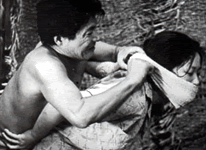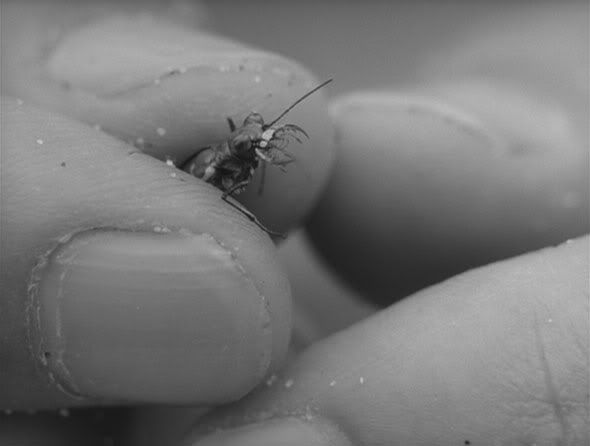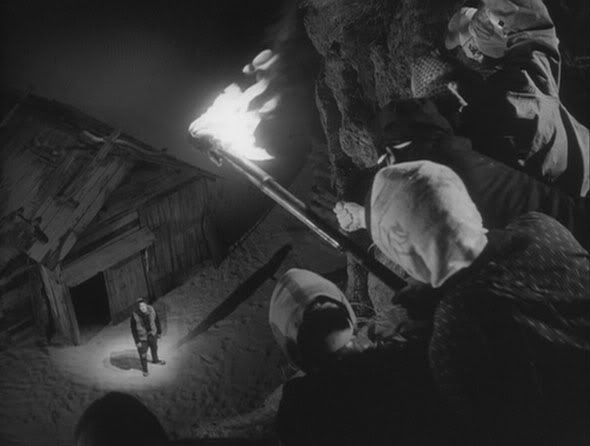Woman in the Dunes

Title: Woman in the Dunes (Suna no Onna) - Director’s Cut
Rating: 5/5
Genre: Drama, Horror, Romance
Starring: Eiji Okada, Kyôko Kishida
Director: Hiroshi Teshigahara
Author: Kôbô Abe
Language: Japanese
Release Date: 1964
Preface: A marriage between a philosophical poet and an experimental surrealist film maker, it is this combination that saw them release three thought provoking films across the span of four years, atmospheric and daring in their willing to push the boundaries of conventional cinema into avant-garde.
 Unlike what you might expect, this is not a meager tale of an elderly woman curiously fashioning a life amongst the dunes, there is far more at work in this film than a simple intrigue. Opening with the rolling dunes, gently washing across the landscape with the wind, it is the entomologist (insect collector) searching amongst the sands that quickly becomes the focus of this tale, exploring for so long that he unwittingly misses the last bus back to civilization. Offered a place to stay by a curious inhabitant, he is taken to the house of a lonely young woman who cares for him until morning and it is only at this point that he realises that the ladder he used to descend to the house has been raised leaving him trapped with her.
Unlike what you might expect, this is not a meager tale of an elderly woman curiously fashioning a life amongst the dunes, there is far more at work in this film than a simple intrigue. Opening with the rolling dunes, gently washing across the landscape with the wind, it is the entomologist (insect collector) searching amongst the sands that quickly becomes the focus of this tale, exploring for so long that he unwittingly misses the last bus back to civilization. Offered a place to stay by a curious inhabitant, he is taken to the house of a lonely young woman who cares for him until morning and it is only at this point that he realises that the ladder he used to descend to the house has been raised leaving him trapped with her. Making every attempt to evade definition, the horror of being trapped and tortured by the sand walls that surround you, like a predator stalking its prey they slowly cave in towards you, taunting and teasing you, forcing you to suffer before it’ll finally but inevitably strike unusually contrasted by the obvious dramatic tensions between the two main characters. The male having been trapped in such a situation garnering the obvious sympathy as the perceived victim, but the woman he suffers along side with is not only a slave to the circumstances as well, but as we quickly learn lost her husband and child to the sand resulting in a swaying empathy, demanding we ask who the real victim is, and the only answer I can concede is that neither are. Through the hopelessness of their own existence, an almost perverse observation from the third entity in their presence, watching them in their isolation gives way to an absurd romance that actually didn’t feel too far from the recently reviewed ‘Last Tango in Paris.’
Much time is spent defining the nature of the sand, the sticky manner it’ll cling to the skin, the many times you see them shaking clothes to remove as much as possible, slowly dwindling as they both gradually become accustomed to it, the stark yet oddly elegant figure of the naked woman coated in the material that both plagues and defines her existence, and the many animals that survive amongst the unrelenting dunes. The cinematography in this regard is absolutely spectacular, only perhaps
 ‘Koyaanisqatsi’ comes close to portraying such a vivid entity, animating the inanimate. The obsession with textures; the waves of sand cascading down, the gentle rising of the damp moisture providing them with their water supply, constantly shifting and changing its form lending it a realistic feel of life, and the careful use of the single oil lantern giving limited light, lending an almost theatrical feel to the proceedings.
‘Koyaanisqatsi’ comes close to portraying such a vivid entity, animating the inanimate. The obsession with textures; the waves of sand cascading down, the gentle rising of the damp moisture providing them with their water supply, constantly shifting and changing its form lending it a realistic feel of life, and the careful use of the single oil lantern giving limited light, lending an almost theatrical feel to the proceedings. The Avant-Jazz soundtrack is back too, but this time feels more poignant; his purpose is made more readily apparent and gives no better demonstration of how he has refined and honed his talent since ‘the pitfall’ than that opening scene, the man slowly walking through the sand lending an ominous tone to otherwise simple footage, creating the knowledge that whilst all feels calm something terrible is just a short way into the distance, and perhaps lightly mocking that fact. The dialogue itself does nothing to counteract this fact, sparingly used to illustrate arguments and situations between the two characters that cannot be portrayed using their physicality. It is in particular the woman, despite her comparative simple-mindedness (especially when put in contrast to the scholarly man who came traveling from Tokyo), offers a valuable insight having come from an entirely foreign background, perceiving life in an altogether unique manner, and most importantly that despite the obvious apparent differences, our purpose and reasoning for the manner of existence aren’t all that different.
The entire film is a large metaphor for the manner in which we rationalise things, the two people trapped by sand walls are no different from anyone else, except perhaps that they can readily see their walls. Instead we are confined by society and its rules and regulations, by the necessity to work – as indeed the woman is, rewarded by working hard by less sand in her midst, more water to drink and the comfort that tomorrow there will be that much less to do – and by the narrow perception of normality within the world. There is also a keen sense of duty to the village, assisting in their survival in the knowledge that you are genuinely making a difference, and the zen theory of simplistic tasks to achieve enlightenment. There may not be the lights of the city, the fast food, cinemas and technology, but he was never interested in these aspects anyway. It was the dunes that he always escaped to,
 to escape his mundane life for the solitude of entomology, and it is the very dunes that captured him that offers him something the city simply can’t.
to escape his mundane life for the solitude of entomology, and it is the very dunes that captured him that offers him something the city simply can’t.Describing it in words won’t do it justice, as the end result feels all too enlightening (as cliché as that sounds), there is a profound message here that isn’t layered behind pretentious ramblings from poetic but ultimately cryptic lines. They don’t pile on the metaphors and let you guess what they’re on about, it’s far too simple for that, and yet the result is so much more than just a tale about some sand, more a parable than anything else. I always hate using the term ‘perfect’ as it always implies that there was no possible way it could have improved irrespective of whether you know how, so instead let me say this: if there’s a fault here I’ll be damned if I can find it.


Comments
Post a Comment